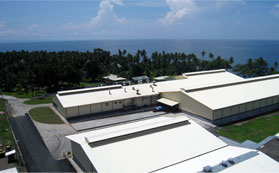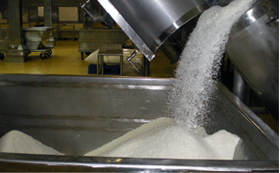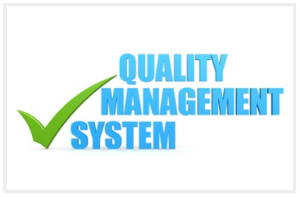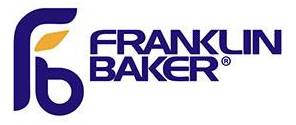Franklin Baker’s manufacturing plants are renowned for producing the highest quality desiccated, processed and value-added coconut products. Critical to the desiccated coconut industry, and our constant focus, are quality attributes such as cut uniformity, consistency, degree of whiteness, moisture levels, sulfite content and the absence of unwanted foreign materials.
Above all else, our compliance to internationally recognized food safety standards related to the microbiological levels in food products and GMP procedures, commands our utmost attention. In pursuit of these exceptional standards, Franklin Baker employs several unique & industry best practices in our manufacturing processes, as well as the use of specialized equipment to help ensure the high quality & safety of our food products.
[wptab name=’Production Facility’]




Franklin Baker operates two coconut-manufacturing facilities in the Philippines. These plants are located in San Pablo City, Laguna and Sta. Cruz, Davao del Sur. Both plants are certified to conform to the ISO 9001 and HACCP quality management systems. In addition, our facilities are certified to conform to the ISO 22000 Food Safety Management System and the British Retail Consortium (BRC) Global Standard for Food Safety. Both plants have received Halal plant accreditation by the Islamic Da’Wah Council of the Philippines and have been Kosher certified by OK Kosher Certification.
Our microbiology laboratories are now accredited to the ISO 17025 Laboratory Management System by the Philippine Accreditation Bureau.
[/wptab]
[wptab name=’Process Equipment’]
A continuous blancher-dryer system is utilized to prevent post microbial contamination after pasteurization (blanching). The coconut meat is subjected to saturated steam at a temperature of at least 200°F for at least three (3) minutes. Steam flow and temperature data is recorded and monitored to ensure continuous control, while our blancher conveyor has an automatic ‘stop safe’ mechanism if steam flow rate and temperature fall below the critical limits.
Our pasteurization system offers significant benefits vs. the industry standard of using the thermal screw system which gives a rotating exposure to steam that is not constant and cannot be clearly monitored. While the thermal screw system is considerably less costly to operate, it has the functional disadvantage of potential recontamination due to the presence of “cold spots” resulting in incomplete kill.
In addition, both our plants have the capability to produce their own steam requirements and have back-up generators in order to help prevent interruption in our manufacturing operations, while our high care processing areas are supplied with filtered air that helps prevents our products from exposure to airborne physical and microbial contaminants.
[/wptab]
[wptab name=’Sampling System’]

We implement an extensive sampling plan by taking samples from each bag of product and combining these as a composite sample, subject to extensive Microbiological testing. This sampling plan was adopted based on US FDA & ICMSF (International Compendium of Microbiological Specifications for Foods).
Non-food contact surface areas are subjected to regular swabbing for pathogen testing, while food contact surface areas are sampled regularly & tested rigorously for indicator organisms.
Surface swabs (ATP & microbiological) are taken before start of operation on all food contact surface areas to validate compliance to cleaning & sanitization procedures.
Deep wells and all water at points of use are sampled regularly for microbiological testing. Process and non-process water supply are regularly tested for chlorine levels.
[/wptab]
[wptab name=’Detection System’]

Microbiological testing includes Aerobic Plate Count, Coliform Group Count, E. coli, Molds, Yeasts, Staphylococcus aureus and Salmonella. We also conduct audit level testing on lipolytic activity.
Our standard operating procedure requires that all products are automatically quarantined. No product is released for shipment unless it receives documented and verified finished product clearance from the Quality Assurance Department.
A major microbiological concern related to coconut production is the presence of a bacterium called Salmonella. Without stringent controls in place, the risk of Salmonella contamination is very high. To ensure the accurate and timely detection of Salmonella, Franklin Baker has adopted the use of rapid and highly sensitive PCR-based pathogen detection systems since the year 2000. These detection equipment amplify the target organism’s DNA and can detect the presence of Salmonella within 26 to 28 hours from start of analysis without the need for additional confirmation.
For foreign matter controls, our manufacturing lines have a minimum number of high strength in-line magnets and metal detectors in place. All of our products pass through these magnets and metal detectors which are regularly tested & verified for effectiveness.
Finally, we conduct inspections of all container vans prior to use including their previous loads. We ensure that each container van is free from leaks, pests and odor. As a further measure to protect our products, the flooring of all container vans are lined with Kraft paper prior to product loading. This procedure was adopted to help mitigate the risk of odor & moisture migration inside the container van.
[/wptab]
[end_wptabset]
